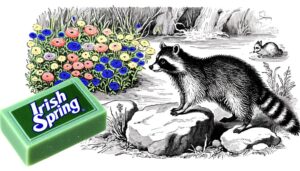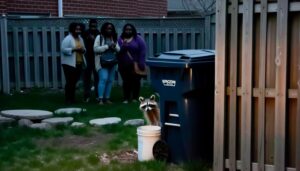How to Own a Raccoon Legally in Georgia – A Step-by-Step Guide
Owning a raccoon in Georgia is subject to stringent regulations. Raccoons are classified as native wildlife, and ownership requires a thorough permit process managed by the Georgia Department of Natural Resources.
Applicants must meet specific criteria, including knowledge of care, adequate facilities, and safety standards. Zoning laws vary, and non-compliance can lead to legal penalties.
Additionally, raccoons must be vaccinated against diseases like rabies and housed in secure enclosures. Ensuring their health involves proper diet, habitat enrichment, and regular veterinary care.
Understanding these requirements is essential for prospective raccoon owners interested in lawful ownership in Georgia.
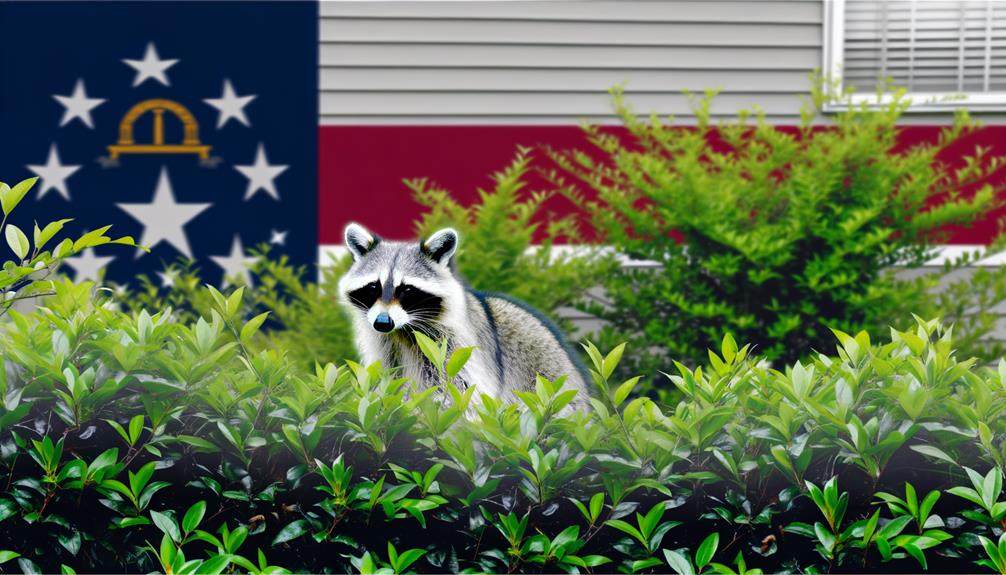
Key Takeaways
- Owning a raccoon in Georgia requires a thorough permit application process from the Georgia Department of Natural Resources.
- Unauthorized capture or ownership of raccoons can result in legal penalties in Georgia.
- Compliance with local zoning laws is essential to legally own a raccoon in Georgia.
- Health regulations mandate vaccinations, proper containment, and regular veterinary check-ups for raccoon ownership.
- Alternatives to raccoon ownership include adopting domesticated pets or volunteering at wildlife rehabilitation centers.
Legal Status in Georgia

The legal status of owning a raccoon in Georgia is governed by specific state wildlife regulations that classify raccoons as native wildlife, thereby imposing stringent ownership restrictions. Under Georgia law, raccoons are considered wild animals and are protected by the Georgia Department of Natural Resources (DNR).
The possession, sale, and transfer of raccoons are strictly regulated to prevent the spread of diseases and to protect native ecosystems. Unauthorized capture or ownership of raccoons can lead to legal penalties, including fines and confiscation of the animal. Additionally, these regulations aim to make sure that raccoons receive proper care and are not subjected to inhumane treatment.
Hence, potential raccoon owners must adhere to these stringent legal frameworks.
Licensing Requirements
The licensing requirements for owning a raccoon in Georgia involve a thorough permit application process that guarantees adherence to state regulations.
Applicants must meet specific legal ownership criteria, which include demonstrating adequate facilities, knowledge of raccoon care, and compliance with public health and safety standards.
This process is designed to safeguard both the welfare of the animal and the community.
Permit Application Process
Applying for a permit to own a raccoon in Georgia involves meeting specific licensing requirements set forth by the Georgia Department of Natural Resources.
The application process necessitates the completion of a detailed form detailing the purpose of ownership, housing conditions, and care plans for the raccoon. Additionally, applicants must provide proof of adequate facilities that adhere to the department's standards for animal welfare.
A thorough background check may be conducted to ensure compliance with state wildlife regulations. Submission of the application typically requires an accompanying fee, the amount of which varies.
Upon receipt, the department reviews the application, evaluating the suitability of the prospective owner and the proposed environment for the raccoon. Approval or denial is communicated in writing.
Legal Ownership Criteria
To legally own a raccoon in Georgia, individuals must meet specific licensing requirements established by the Georgia Department of Natural Resources. Applicants must first obtain a Wildlife Exhibition Permit, which necessitates submitting detailed information regarding the animal's housing, diet, and veterinary care. The enclosure must meet stringent standards to ensure the raccoon's well-being and safety.
Moreover, the permit requires proof of rabies vaccination and other health certifications for the raccoon. Regular inspections by wildlife officials are mandated to maintain compliance with state regulations. Additionally, owners must demonstrate knowledge of raccoon behavior and handling to minimize risks to both the animal and the public. Non-compliance with these criteria may result in penalties or revocation of the permit.
Zoning Laws
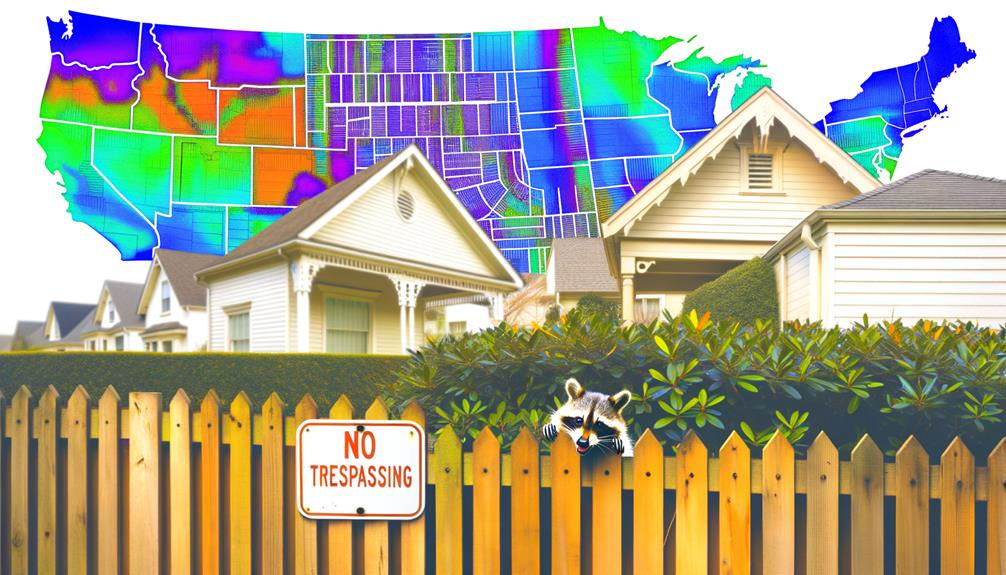
Understanding the complexities of zoning laws in Georgia is important for prospective raccoon owners to guarantee they comply with local regulations. Zoning laws vary significantly across different municipalities and counties, affecting the legality of keeping exotic pets, including raccoons. These laws are designed to maintain public order and safety, and non-compliance can lead to substantial fines or confiscation of the animal.
Below is a table highlighting key zoning considerations:
| Zoning Aspect | Description |
|---|---|
| Residential Zones | Restrictions on exotic pet ownership |
| Agricultural Zones | May allow more flexibility for animal keeping |
| Urban Areas | Typically stricter due to population density |
Consulting local zoning officials and reviewing municipal codes is essential to determine specific requirements and avoid legal complications.
Health and Safety Regulations
Health and safety regulations for raccoon ownership in Georgia encompass a range of requirements aimed at ensuring both the well-being of the animal and the protection of public health. Owners must comply with strict guidelines, which include:
- Vaccinations: Raccoons must receive vaccinations against rabies and other zoonotic diseases.
- Containment: Proper containment facilities are required to prevent escape and minimize contact with humans and other animals.
- Regular Health Checks: Annual veterinary check-ups are mandated to monitor the raccoon's health and detect potential diseases.
- Reporting: Owners must report any signs of illness to local health authorities to manage public health risks.
These regulations are critical for maintaining a safe environment for both raccoons and the community.
Care and Maintenance
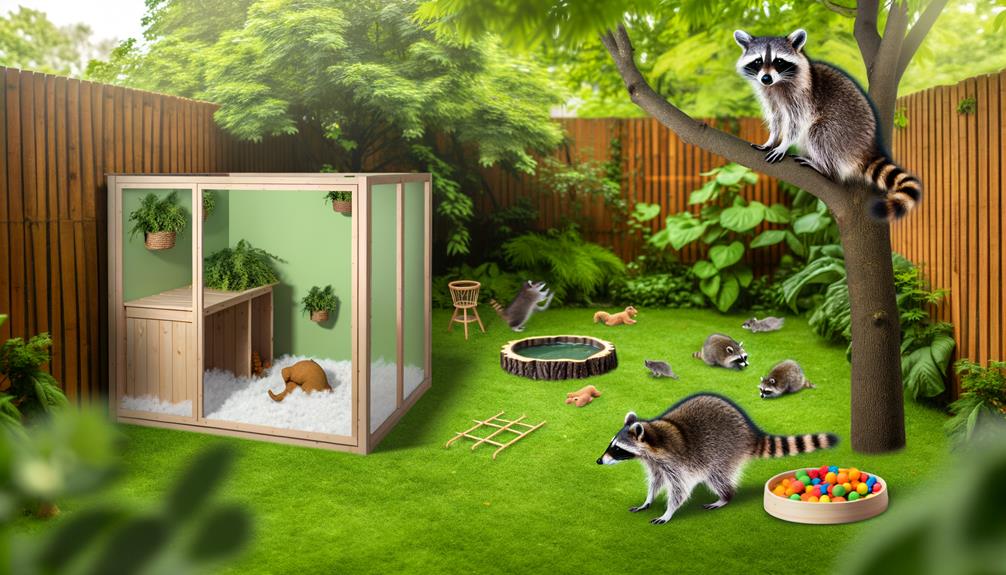
Ensuring the proper care and maintenance of a raccoon in Georgia involves attention to several critical aspects. Owners must provide a balanced diet tailored to the species' nutritional needs.
Establishing an appropriate habitat that mimics their natural environment is crucial.
Scheduling regular veterinary visits to monitor health and prevent diseases is also essential.
Addressing these points is vital to maintaining the well-being and longevity of the raccoon.
Feeding and Diet
When formulating a diet for a pet raccoon in Georgia, it is essential to keep in mind their omnivorous nature and nutritional requirements to ensure balanced and adequate nutrition. Raccoons benefit from a varied diet that imitates what they would consume in the wild.
Their diet should include:
- Proteins: Lean meats, fish, and eggs provide essential amino acids.
- Fruits and Vegetables: Apples, berries, carrots, and leafy greens supply necessary vitamins and fiber.
- Grains: Whole grains like brown rice and oats offer energy and digestive health.
- Specialized Raccoon Food: Commercially available raccoon feed guarantees a balanced intake of nutrients.
Providing a diverse and well-rounded diet promotes overall health and longevity in pet raccoons.
Habitat Setup
In addition to a well-balanced diet, creating a suitable habitat for a pet raccoon in Georgia involves careful consideration of space, enrichment, and safety to mimic their natural environment.
A spacious enclosure, ideally at least 10×10 feet, is vital to allow for ample movement and exploration. Incorporate various climbing structures, branches, and platforms to cater to their arboreal tendencies.
Enrichment items such as puzzle feeders, toys, and water features should be included to stimulate their cognitive and physical activity. Guarantee the enclosure is escape-proof and secure, with appropriate fencing and locks.
Adequate shelter from weather elements, proper ventilation, and regular cleaning are essential to maintaining a healthy and comfortable living environment for the raccoon.
Health and Vet Visits
Regular veterinary check-ups are essential for monitoring the health of a pet raccoon and detecting any potential medical issues early. A thorough vet visit should include vaccinations, parasite control, and dental care. Raccoons, like all animals, are susceptible to various illnesses and require specialized care to thrive in a domestic setting.
To maintain peak health, consider the following:
- Vaccinations: Administering vaccines to protect against diseases such as rabies and distemper.
- Parasite Control: Routine treatments for internal and external parasites like fleas and worms.
- Nutritional Assessment: Ensuring a balanced diet to prevent obesity and nutritional deficiencies.
- Dental Care: Regular dental check-ups to prevent periodontal disease, which can lead to severe health complications.
Consistent veterinary care is paramount for a raccoon's well-being.
Feeding and Diet
A balanced diet for a pet raccoon in Georgia should include a mix of fruits, vegetables, and high-quality protein sources to maintain excellent health and nutrition. Fruits such as apples, grapes, and berries provide essential vitamins and antioxidants. Vegetables like carrots, sweet potatoes, and leafy greens offer necessary fiber and minerals.
Proteins should come from lean meats, poultry, and fish, ensuring adequate intake of amino acids. Commercially available raccoon food can also be incorporated but should not be the sole dietary component. Supplements, such as calcium and vitamin D3, may be necessary to prevent deficiencies.
Freshwater must be available at all times. Careful monitoring of portion sizes is crucial to prevent obesity, a common issue in captive raccoons.
Housing Needs

Ensuring ideal housing conditions for a pet raccoon in Georgia is paramount to its overall well-being, complementing the balanced diet critical for its health. Proper housing should provide ample space, safety, and environmental enrichment. Essential housing elements include:
- Adequate Space: A spacious enclosure, preferably exceeding 100 square feet, allowing for physical activity and exploration.
- Safety Features: Secure enclosures with reinforced wiring to prevent escapes and protect against predators.
- Environmental Enrichment: Climbing structures, nesting areas, and diverse substrates to stimulate natural behaviors.
- Climate Control: Protection from extreme temperatures, ensuring a stable environment between 60-80°F.
These factors collectively support the physical and psychological health of a pet raccoon, ensuring it thrives in a domestic setting.
Socialization and Behavior
Raccoons exhibit a wide range of temperaments, influenced by factors such as genetics, environment, and early socialization. Their interactions with humans can vary greatly, from friendly and curious to defensive and aggressive.
Understanding these behavioral nuances is important for potential raccoon owners in Georgia to maintain a safe and harmonious coexistence.
Raccoon Temperament Variability
Understanding the variability in raccoon temperament necessitates a thorough examination of their socialization and behavior patterns. Raccoons exhibit a wide range of temperamental traits influenced by genetic, environmental, and experiential factors.
Key aspects of their temperament variability include:
- Aggression Levels: Some raccoons may display heightened aggression, particularly when threatened or cornered.
- Curiosity and Playfulness: Many raccoons exhibit a strong sense of curiosity and playful behavior, often exploring their surroundings.
- Fear Responses: Variability in fear responses can be observed, with some raccoons showing extreme wariness towards new stimuli.
- Social Interactions: Social behaviors range from highly sociable to solitary tendencies, influenced by early socialization experiences.
Understanding these facets is essential for managing raccoon behavior and ensuring their well-being.
Interaction With Humans
Examining the interaction between raccoons and humans reveals how socialization and behavior patterns are shaped by human influence and environmental context. Raccoons raised in captivity often exhibit different behavioral traits compared to their wild counterparts.
Human-reared raccoons might display increased docility and reduced fear of human presence due to early and consistent socialization. However, these animals retain their innate curiosity and dexterity, leading to behaviors such as foraging through household items. Stress-induced aggression can occur if raccoons feel threatened or confined.
Understanding these behavioral dynamics is essential for potential raccoon owners in Georgia, as it informs proper care, enrichment, and handling practices to guarantee the welfare of both the animal and the humans involved.
Veterinary Care
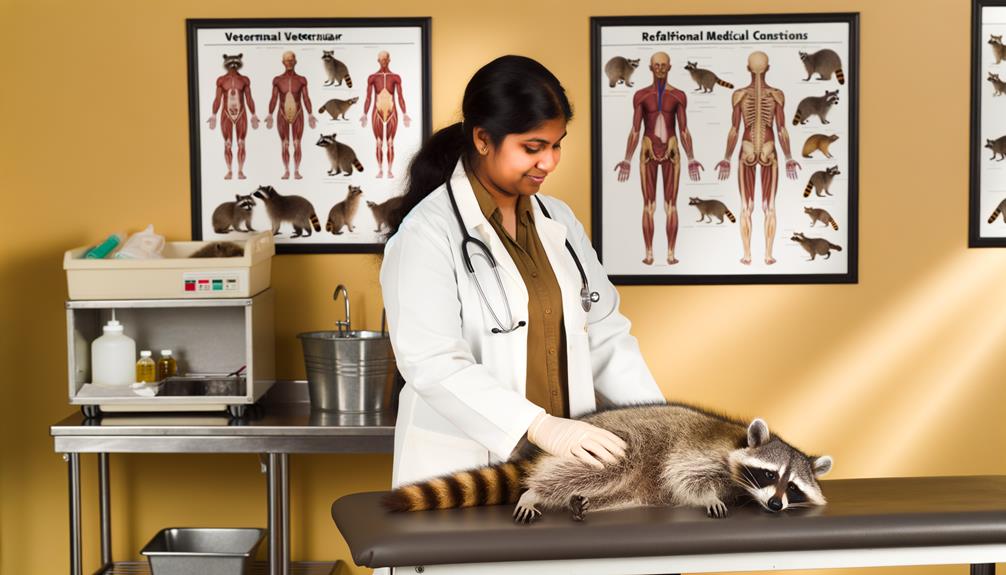
Securing appropriate veterinary care for a pet raccoon in Georgia involves understanding the unique health needs and legal requirements specific to this species. Proper medical attention is essential to maintain their well-being.
Key considerations include:
- Vaccinations: Guarantee raccoons are vaccinated against rabies and other common diseases to prevent outbreaks.
- Dietary Needs: Consult with a veterinarian to establish a balanced diet that meets their nutritional requirements.
- Parasite Control: Regular check-ups for internal and external parasites are crucial to prevent health complications.
- Behavioral Health: Monitor for signs of stress or behavioral issues, and seek professional advice when necessary.
Meeting these needs helps secure the health and longevity of your raccoon, aligning with Georgia's regulatory standards.
Alternatives to Ownership
Considering alternatives to owning a raccoon in Georgia can offer potential pet owners with other viable options that align with both state regulations and the animal's welfare. Instead of pursuing raccoon ownership, individuals might consider adopting domesticated animals that require less specialized care and are legally permissible. Wildlife rehabilitation centers and sanctuaries offer opportunities for interaction and education without the commitment of ownership. Volunteering at these facilities can be fulfilling and educational. Additionally, fostering domesticated animals from local shelters is another responsible choice.
| Alternative Option | Benefits | Requirements |
|---|---|---|
| Adopting Domesticated Pets | Easier care and legal compliance | Regular pet care |
| Volunteering at Sanctuaries | Educational and non-committal | Time and willingness to learn |
| Fostering Shelter Animals | Temporary care without long-term commitment | Basic pet care knowledge |
These options safeguard both human and animal well-being.
Conclusion
To sum up, the ownership of raccoons in Georgia is governed by a stringent framework of legal statutes, licensing requirements, and zoning laws. Compliance with health and safety regulations, along with proper care, housing, and socialization, is imperative.
Veterinary care remains a critical aspect of responsible ownership. Given the complexity of these regulations, considering alternative forms of interaction, akin to skipping the VHS and opting for streaming services, may offer a more feasible solution for those interested in raccoons.

